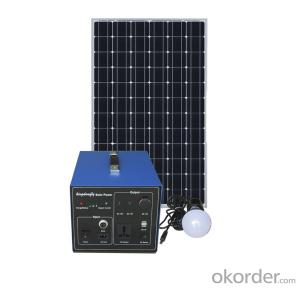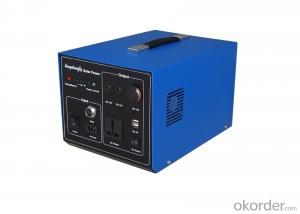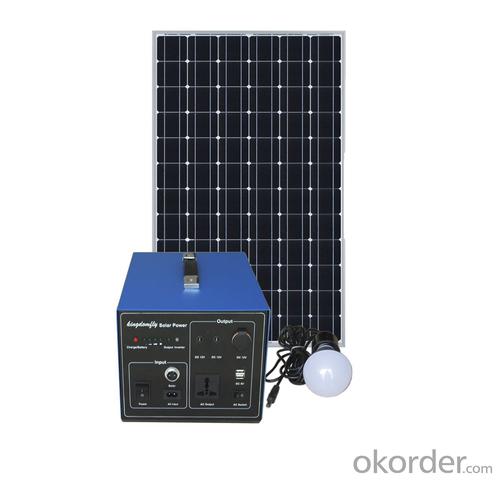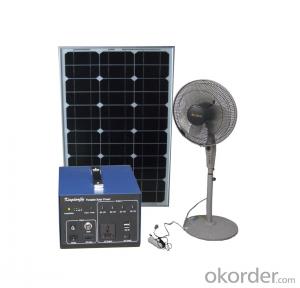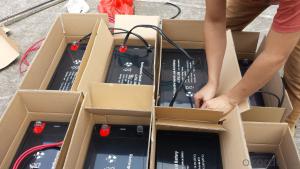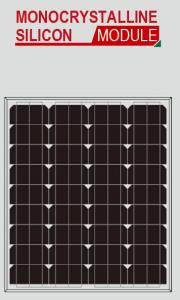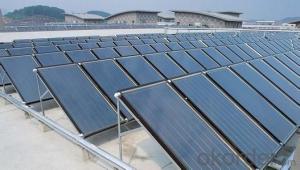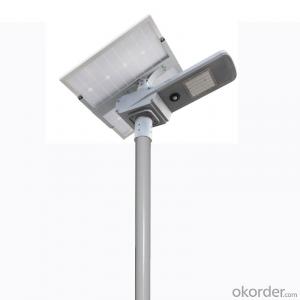Portable Solar Lighting System Hot Selling SPS_80W
- Loading Port:
- China main port
- Payment Terms:
- TT OR LC
- Min Order Qty:
- 3 pc
- Supply Capability:
- 10000 pc/month
OKorder Service Pledge
OKorder Financial Service
You Might Also Like
Main Information
SPS_80W This product is high performance,family used portable solar power system,which can receive energy and store it in battery outside connected to SPK by solar energy on sunny day,and supplies electric power for varies appliances such as electric fan,lighting lamps, television, portable computer etc.It can supply power for both DC and AC electric application .It’s very helpful and useful for home electric supply.
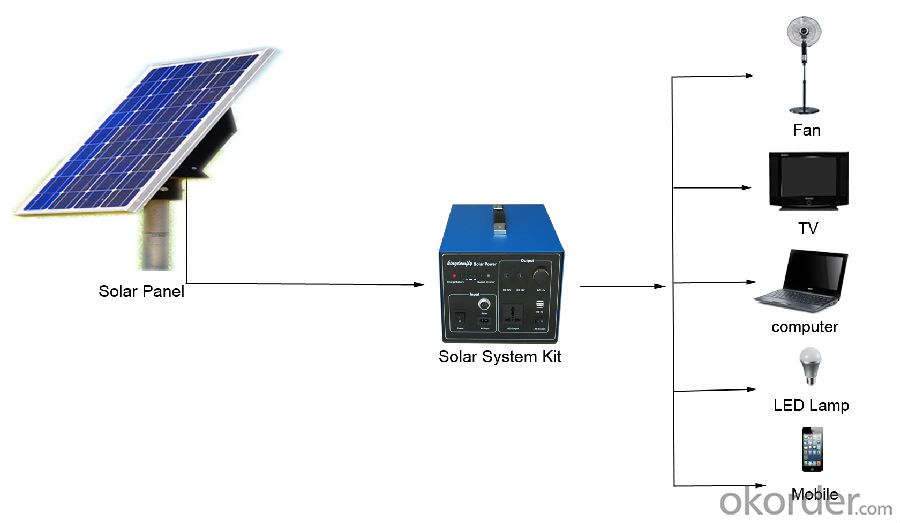
Features
◆ Both Solar charge input and AC charge input.
◆ Both DC and AC output
◆ Solar Feedback Circuit Protection
◆ Output Short-circuit Protection
◆ Solar「+」「-」anti-access protection
◆ Output「+」「-」anti-access protection
◆ Over Charged Protection
◆ Over Discharged Protection
◆ Over Load Protection
◆ Over-Temperature Protection
Technical parameters
Specification | Value/Material | |
Item No. KDF | SPS_80W | |
Solar Recommended | Specification | Poly silicon |
Working Voltage/Power | 18V80WP | |
Battery | Rated Voltage/Capacity | 12V40AH |
Cycle Number | 80% Deep Cycle Number:500 70% Cycle Number:800 | |
Working Temperature | Short Period(one Month):-20~50℃ Long Period(Six Months):-10~45℃ | |
Charging Controller | Operating Voltage | 12V |
Input Voltage | 17.3V~21V | |
Input current | MAX:10A | |
Power Consumption | MAX: 5mA | |
Low Voltage Disconnect(LVD) | 10.8V | |
Low Voltage Reconnect(LVR) | 12.3V | |
High Voltage Discharge( HVC) | 14.6V | |
High Voltage Recharge(HVR) | 13.8V | |
Temperature Protection | 60℃ | |
DC Output | DC output & Application | USB 5V1A*2 |
DC output & Application | DC 12V1*4A | |
AC Output | Output Wave | Modified Wave |
Input Voltage | 11V~15V | |
Output Voltage | 110V±10% | |
Output Frequency | 60Hz±2Hz/50Hz±2Hz | |
Rated Output Power | 300W/500W | |
Maximum VA | 600VA/1000VA | |
Maximum Efficiency | 88% | |
Temperature | 0-40℃ | |
Over Temperature | 60℃~70℃ | |
Low Voltage Alarm | 11V | |
Low Voltage Shut off | 10.5V | |
High Voltage Shut off | 16V | |
Package | Set size | 328*252*267mm |
Set N·W | 11.6kg | |
Set N·W | 12.8kg | |
- Q: Can a solar energy system be used in areas with high humidity?
- Yes, a solar energy system can be used in areas with high humidity. While it is true that high humidity can affect the performance of a solar energy system to some extent, modern solar panels are designed to withstand various weather conditions, including high humidity. The efficiency of solar panels may decrease slightly in high humidity due to the moisture in the air, but it is not a significant factor that would render solar energy systems ineffective. Additionally, proper maintenance and cleaning of the panels can help mitigate any potential issues caused by humidity. Overall, solar energy systems can still be effectively utilized in areas with high humidity.
- Q: Are there any disadvantages to using solar energy systems?
- Yes, there are a few disadvantages to using solar energy systems. Firstly, the initial installation cost can be high, making it less accessible for some individuals or communities. Secondly, solar panels require a significant amount of space to generate optimal power, making them less suitable for small or densely populated areas. Additionally, solar energy production is dependent on weather conditions, meaning its output may be variable and less reliable compared to traditional power sources. Lastly, the production and disposal of solar panels can have environmental impacts, especially if not properly managed. However, despite these disadvantages, the long-term benefits of solar energy, such as reduced greenhouse gas emissions and lower energy costs, often outweigh these drawbacks.
- Q: Are there any limitations to the lifespan of solar energy systems?
- Yes, there are limitations to the lifespan of solar energy systems. While solar panels have an average lifespan of 25 to 30 years, their efficiency gradually decreases over time. Additionally, other components such as inverters may need to be replaced after 10 to 15 years. Regular maintenance, including cleaning and repairs, is also necessary to ensure optimal performance. However, advancements in technology and regular upgrades can extend the lifespan of solar energy systems.
- Q: Can solar energy systems be used in areas with limited access to solar connectors and cables?
- Yes, solar energy systems can be used in areas with limited access to solar connectors and cables. Off-grid solar systems, such as stand-alone solar power systems or solar generators, are designed to function independently from the main power grid. These systems typically include batteries for energy storage, allowing the generated solar energy to be used even during periods of limited sunlight or at night. Therefore, they can be deployed in remote areas or areas with limited infrastructure, providing sustainable and reliable power solutions.
- Q: Can solar energy systems be used in areas with limited access to solar panel manufacturers?
- Yes, solar energy systems can still be used in areas with limited access to solar panel manufacturers. In such cases, it may be necessary to import solar panels or collaborate with manufacturers in other regions. Additionally, alternative sources for solar panels, such as second-hand or refurbished panels, can also be explored. Furthermore, local training programs can be established to educate individuals on solar panel installation and maintenance, enabling them to set up and maintain their own solar energy systems in areas with limited access to manufacturers.
- Q: How do solar energy systems affect the carbon footprint?
- Solar energy systems significantly reduce carbon footprint. They generate electricity by harnessing the sun's energy, which is a clean and renewable source. This eliminates the need for fossil fuels, such as coal and natural gas, that release harmful carbon dioxide emissions when burned. By using solar energy, we can minimize greenhouse gas emissions and combat climate change.
- Q: Can solar energy systems be used for powering space exploration missions?
- Solar energy systems have the capability to power space exploration missions. In space, solar energy is a clean and renewable power source that is abundant. It is already being utilized for various space missions, including the International Space Station (ISS), Mars rovers, and satellites. Photovoltaic (PV) cells, also known as solar panels, convert sunlight into electricity. They are lightweight, compact, and easily integrated into spacecraft design. Solar panels are particularly beneficial for missions near the Sun or in well-lit areas of space, as they can provide a consistent and dependable power source. The ISS, for instance, heavily relies on solar power. It is equipped with large solar arrays that capture sunlight and generate electricity to meet the crew's energy needs and power various onboard systems. Mars rovers like Curiosity and Perseverance also employ solar panels to operate on the red planet. Solar energy systems offer several advantages for space exploration missions. Firstly, they eliminate the need for bulky and limited fuel sources such as batteries or radioactive materials, reducing mission weight and costs. Secondly, solar energy systems require minimal maintenance, providing a long-lasting and reliable power source. Additionally, solar power is environmentally friendly, emitting no pollutants or emissions during operation. However, there are limitations to using solar energy in space exploration. For missions that venture far from the Sun or operate in areas with limited sunlight, alternative power sources like nuclear energy or fuel cells may be necessary. Additionally, solar panels are vulnerable to damage from micrometeoroids, radiation, and other space debris, necessitating protective measures and backup systems. In conclusion, solar energy systems have demonstrated their viability and efficiency in powering space exploration missions. Their ability to convert sunlight into electricity, combined with their lightweight and compact design, make them an ideal choice for providing sustainable and dependable power in space.
- Q: Are there any government incentives for installing solar energy systems?
- Yes, there are government incentives for installing solar energy systems. Various countries offer incentives such as tax credits, grants, and rebates to encourage the adoption of solar energy. These incentives aim to lower the upfront costs of installation and make solar energy more affordable and accessible to homeowners and businesses. Additionally, some governments may provide feed-in tariffs or net-metering programs that allow solar system owners to earn credits or receive compensation for excess electricity generated.
- Q: Can a solar energy system be installed on a government building or facility?
- Certainly, it is possible to install a solar energy system on a government building or facility. In fact, numerous governments worldwide have actively advocated for and implemented renewable energy initiatives, specifically solar power, on their establishments. The installation of solar panels on government buildings not only aids in reducing carbon emissions and dependence on fossil fuels but also sets a positive example for the community and encourages the adoption of clean energy technologies. Moreover, solar energy systems can assist governments in saving money on electricity bills in the long term while providing a more sustainable and resilient energy source. All in all, the installation of solar energy systems on government buildings is a feasible and increasingly favored choice for promoting clean energy and combating climate change.
- Q: Can solar energy systems be used for powering electric bikes?
- Yes, solar energy systems can be used to power electric bikes. Solar panels can be installed on the roofs of houses or on specific structures to harness sunlight and convert it into electricity. This electricity can then be used to charge the batteries of electric bikes, providing a renewable and sustainable source of power for transportation.
Send your message to us
Portable Solar Lighting System Hot Selling SPS_80W
- Loading Port:
- China main port
- Payment Terms:
- TT OR LC
- Min Order Qty:
- 3 pc
- Supply Capability:
- 10000 pc/month
OKorder Service Pledge
OKorder Financial Service
Similar products
Hot products
Hot Searches
Related keywords
